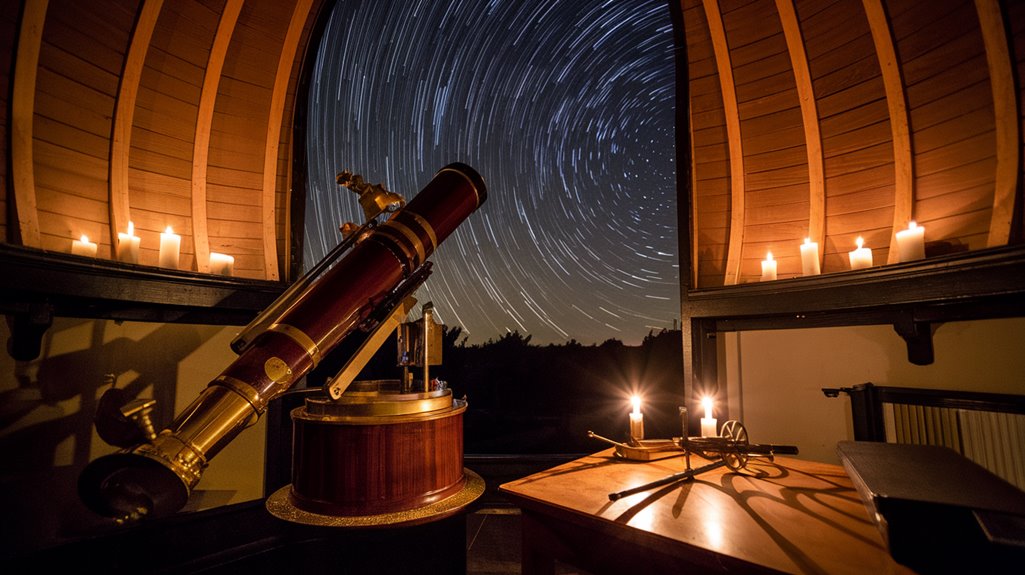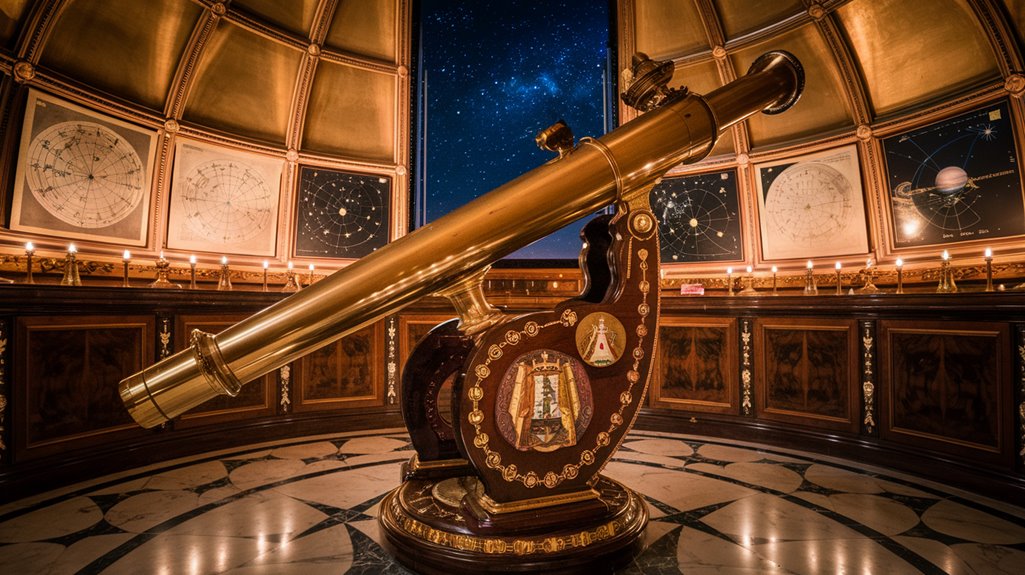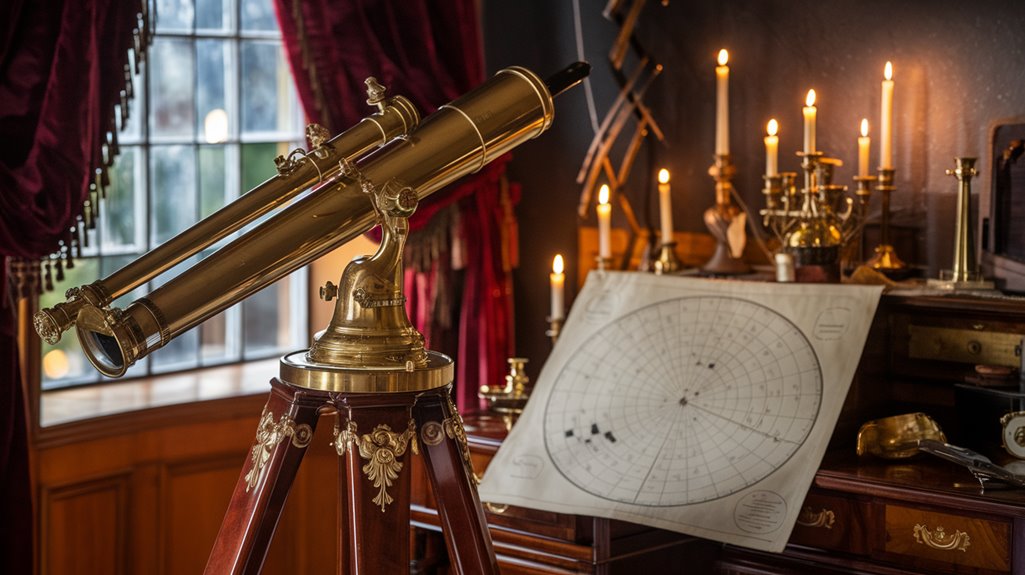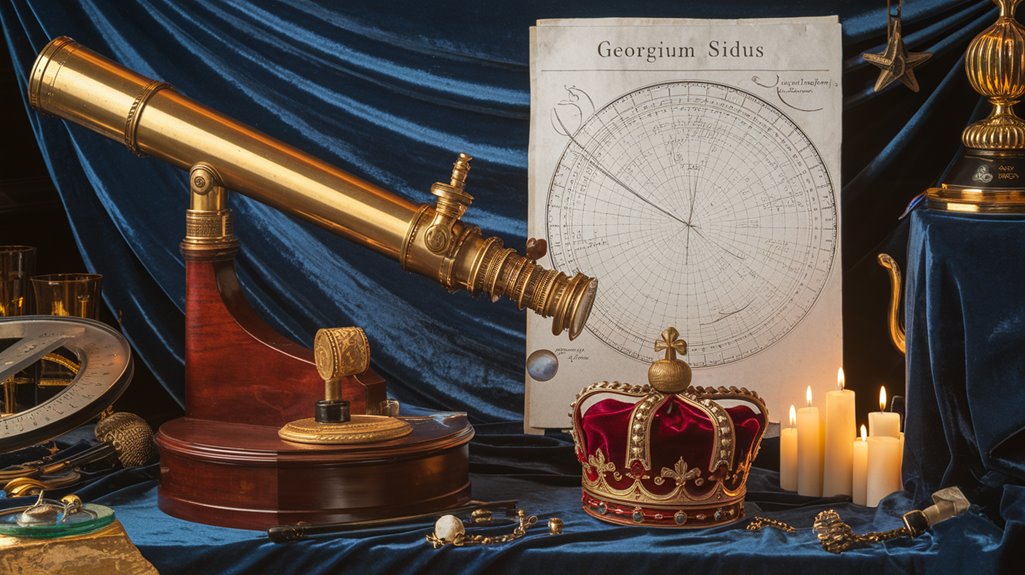George’s Star: Uranus Was First Named for King George
You might think you know Uranus as the seventh planet from the sun, but there's an interesting twist to its identity. Before it carried the name of an ancient Greek deity, this celestial body bore a distinctly British title that honored King George III. The story behind this royal connection reveals more than just a naming dispute—it opens a window into a fascinating period when astronomy, politics, and cultural pride collided in unexpected ways.
The Discovery That Changed Astronomy

When William Herschel discovered Uranus in 1781, he didn't just find a new planet – he revolutionized our understanding of the solar system. His discovery validated the Titius-Bode Law, a mathematical formula predicting planetary distances from the sun, which boosted astronomers' confidence in theoretical predictions.
You'll find that Uranus's discovery triggered a chain of astronomical breakthroughs. When scientists noticed irregularities in Uranus's orbit, they suspected another planet's gravitational pull. This led directly to Neptune's discovery, though it ultimately challenged the simple form of the Titius-Bode Law. Herschel initially named the planet Georgium Sidus to honor King George III of England. The discovery spurred the subsequent identification of Ceres and Pallas as new celestial bodies.
Herschel's methodical sky observations also set new standards for astronomical research, inspiring improved star mapping techniques and more systematic approaches to celestial observation. His achievement earned him immediate fame, Royal Society membership, and the prestigious Copley Medal.
William Herschel's Royal Tribute
Fresh from his groundbreaking discovery, William Herschel sought to honor King George III by naming the new planet "Georgium Sidus" (George's Star). Herschel's intentions were clear: pay tribute to the reigning monarch who'd supported his astronomical pursuits.
This royal influence would shape the planet's initial identity, though it wouldn't last forever. Herschel made this remarkable find using his 6.2 inch reflecting telescope. His critical observations on March 13, 1781 would forever change our view of the solar system.
You might be interested to know that the name faced several challenges:
- The scientific community preferred mythological names for consistency
- German astronomer Johann Bode proposed "Uranus" as an alternative
- By 1850, "Georgium Sidus" had fallen out of common use
While Herschel's royal tribute didn't stick, his discovery remained monumental. The finding expanded humanity's understanding of the solar system and established Herschel as a celebrated figure in both scientific circles and public life.
The Battle Over Planetary Names
As astronomy evolved beyond casual stargazing, the need for standardized planetary names became increasingly urgent.
You can see this tension in the battle over Uranus's name, where William Herschel's choice of "Georgium Sidus" clashed with established naming conventions. The scientific community strongly opposed naming planets after royalty, preferring the historical significance of mythological references. Like the ancient naming tradition, planetary names have deep roots in mythology that extend back thousands of years. This debate occurred during a time when early telescopic observations in the 1600s were revolutionizing how celestial features were cataloged and named.
The dispute highlighted why standardized naming became essential. When the International Astronomical Union formed in 1919, they established clear guidelines: new celestial bodies must follow Greco-Roman mythological traditions, and names can't honor recent political figures or living persons.
Today, you'll notice this consistency across our solar system, from Mercury to Neptune. Uranus's naming controversy helped shape these modern astronomical naming practices.
From British Honor to Classical Mythology
Though William Herschel discovered Uranus in 1781, his choice to name it "Georgium Sidus" after King George III sparked immediate controversy.
You'll find that astronomers, particularly Johann Elert Bode, opposed breaking from traditional naming conventions that honored classical mythology. The scientific community pushed for "Uranus," derived from the Greek god of the sky, to maintain mythological significance in astronomical naming. As the mythological Uranus emerged from primeval Chaos, his role as the personification of heaven made him a fitting namesake for the celestial body. Herschel received a £200 annual pension as the King's Personal Astronomer for his groundbreaking discovery.
Key aspects of this naming alteration include:
- The shift from honoring British royalty to preserving classical traditions
- Bode's successful campaign to align the planet's name with mythological connections
- The widespread adoption of "Uranus" by 1850, replacing Herschel's original proposal
When you look at the final choice, you'll see it perfectly fit the celestial context while honoring ancient Greek mythology's personification of heaven.
The Legacy of Two Names

During the early years of the planet's discovery, two distinct names competed for recognition in the scientific community: "Georgium Sidus" and "Uranus." While British astronomers initially favored Herschel's patriotic tribute to King George III, the international community pushed for a name that would align with classical mythology. William Herschel's discovery in 1781 marked a pivotal moment in astronomical history, as it was initially mistaken for a comet.
The name significance of this debate extended far beyond simple terminology. You'll find that "Uranus" ultimately prevailed by 1850, setting an essential precedent for future planetary naming conventions based on mythological themes.
The cultural impact of this change reflected a shift from nationalistic naming practices to internationally accepted standards. Today, you're familiar with the standardized pronunciation of Uranus (/ˈjʊərənəs/ or /jʊˈreɪnəs/), and its name has inspired related terms, including the element uranium.










